
Leadership development in Norway – an outlook to the future
We are living in a world that is constantly changing. Due to the digitalization and globalization, we are much more connected, which has its benefits but can be challenging as well sometimes. John Livden works as a trainer, mainly in Norway, but as well with international companies. We talked to him and wanted to know more about the current challenges for leaders in Norway, the influence of the digitalization for leadership and development measures and his outlook on the future.

About the interview partner
John Livden works as an executive coach and leadership trainer. His passion is to work together with people and help them succeed. He enables people to discover their uniqueness and possibilities, inspires them to take charge and full responsibility for their own lives and help them grow into their full potentials as leaders/managers and human beings.
According to your opinion, what do you think are currently the biggest challenges for Norwegian companies when it comes to leadership and how can they master them?
John: I think that the biggest challenge is actually the gap between management and leadership. Managing the projects, the people and the organization takes up so much time for leaders. My experience is, that a lot of leaders really feel this pressure. There so many things they have to do and the thoughts they have in their mind. I think that one solution to this problem could be the implementation of new agile leadership styles, where the leadership tasks are not only with the leaders but also with other employees of the company. This has a lot to do with coordination and cooperation between people and the way they work together. Successful leaders should be able to manage the complexity around them and still find time to actually build relationships, to communicate and to be there for their employees.
You are working with international companies and leaders. What are the most important skills when working as a trainer on an international level?
I think you need to have a good radar. You can’t know everything because you are not native. You have to be aware that you are working together with people from another culture. Try to find connection points and try to understand the differences. And probably most important, always pay respect for their culture. Keep in mind that there could be cultural elements that are inhibiting the learning process which leads to conflicts. In this case, sometimes cultural differences can be a hinder for development. As a trainer and consultant, you have to be aware that you have challenge things from time to time. Make sure to know how to do this in a good way.
What would you tell a trainer who has her/his first training in Norway? Do you have any tips?
I think, when we are specifically talking about Norway, it is important to understand, that the Norwegian culture and the Norwegian working-culture is very different from, for instance, the German or even the Danish one. Actually, many people see the Scandinavians as one entity, but there are differences between Norway, Sweden, and Denmark as well. We should definitely be aware of this. It is really interesting to see the differences the way people make decisions, how they approach problem-solving, discuss and handle conflicts. For example, the difference in the overall picture between a Norwegian and a Danish, when it comes to a business setting is following: The Danish has a much more continental influence on their business style and is more business oriented, as well as a little bit more formal and hierarchical. Of course, we do have hierarchies in Norway as well, but we have a much more egalitarian view on the work life. The power distance between the managing director and the genitor often seems lower. This is as well a difference to Germany or Austria. They are much more formal in the way they are working and how they are addressing each other. But I think this will also change with generations. In Norway, we are very informal in general, also in the workplace. Some people can also experience it a bit rude, when you really meet in eye level and people speak their mind, in some cases more freely.

The working-culture in Norway is very different from, for instance, the German or even the Danish one. The power distance between the managing director & genitor often seems lower and the view on the work life is much more egalitarian.
The influence of e-Learning in leadership development
So you said that this informal/formal way of addressing will change with generations. We can already see many changes between the generations in companies. Keyword: digital natives and digital transformation. How do see this? How does the digital transformation influence the work life in Norway already?
I think, when it comes to the Norwegian society, we are in the middle of the shift. Sometimes I am a little bit surprised when I am working in Germany for instance, and see that they are not there yet. Online we are connected, this is the way we live. But this can be very stressful for leaders, who are for instance 50+. Much more stressful than for a 20-year-old, who is growing up as a digital native and who is working seamlessly with different online platforms and systems. For a leader who did not grow up in this digital time, it could be challenging. It creates some tension between the way how his/her generation is doing things and “the new way of doing things.” All in all, I think that in Norway, we are really getting along with the digitalization on all levels of society. Public services, social security, taxes, the medical system, etc. – everything is online now. It is getting more and more digital and people are getting used to it. When they don’t, this will be a real problem. I have been putting a lot of effort, also in my interest, to use more digital tools.
This is something you probably also see as a training and development guide. Are you using a lot of e-learning during your training?
It really depends. In this case, I am kind of more a “classical trainer” who loves one-to-one-interaction: physically in the classroom but also in some group-settings. I know, that there are more and more courses available on the internet. E-learning is a component in almost every company. Many companies have e-learning platforms for many different skills, not only leadership skills. Our business world is very digital already, all of it and I think we will see more of it in the future. Besides that, I think that you cannot rely on digital solutions at 100%. For me, leadership has a lot to do with who you are and what you do. You can learn the theory, you can study the method, you can have check-lists but you cannot substitute the factor of human leadership. Leadership development is very closely connected to personal development. It is also about a leader being responsible for his or her behavior, attitude, communication and the way they come across. You can read this in theory but basically, you need to do it in practical life.
So when we are coming back to e-learning, I think that you can study the theory with the support of e-learning but the human interaction is missing. I really embrace the digital shift and I see a lot of positive things and, as I said before, I think that we have just seen the start of it. But we still need the human element. You can automate things and use things such as artificial intelligence but things can go crazy if we leave leaderships just to algorithms. As a leadership trainer, team trainer and organizational development consultant it is very important to have this human factor. This factor is based on relation, experience and knowledge – theoretical knowledge is not enough. This is perhaps also the deviation between leadership as a technique and leadership as an art. There is no 100% right answer to this. It takes a person and a character. In my experience, the most giving leadership development programs are the ones, where we go so close to the person, the leader and where we challenge them on a very personal level. This can be quite deep actually.
So would you agree that e-Learning is more an add-on and can be used for theory or as a follow-up?
Yes, it can be a real add-on. Also in my consultancy, I have an online platform, where we communicate, share things and thoughts, where I can show videos and so on. But this is something in addition to the personal contact and the group exercises.
How do you think that this will be in the future?
I think it will definitely change and we will probably see much more of the digital tools and the digital way of making learning opportunities like virtual reality. Of course, this is something positive. But I also think that we can lose ourselves in being human beings when we just rely on the digital things. Leadership is very practical and it happens in real life and in real life situations, where you cannot control what is happening between people. So there will definitely be surprises and it takes a character to be able to do that.
So all in all: What do you think will be the biggest changes and challenges for organizations, for leadership but also for the training and development industry in general?
We are living in a dynamic world, in which the demands of the employees will be different in the future. The younger generation won’t be willing to work every day from 9 to 5. This generation wants to be more flexible. Therefore we have to find much more flexible solutions and this flexibility leads to complexity as well. For leaders, it will be more difficult to control the work of their employees and to keep an overview. If you are giving the people more freedom, you are losing some control you traditionally had as a leader. This had been a very huge change and I think we have only seen the start of it. This is one example of what will change in the next years. So it is important to create a company culture, where flexibility is a big part of it. But it is important as well, to be able to be one unit, one company, one organization. Many leaders have already lost and will probably lose some of their formal power and structural power, so what will there be left? Leadership will be more about the relationships, the communication, the flow of things and much more. Leaders have to make up a new mindset and that requires much more agility and the ability to drive in a world that starts to work quite differently than it was in the past.
What serves you next?
International leadership development in Bulgaria
Diliana Docheva, Ph.D., works as a facilitator, consultant, speaker and development guide for more than 25 years. We talked with her about international leadership development, why it is important that managers have to let go their personal control and involvement in every decision, and about the currently biggest challenges for companies in her home country Bulgaria.
Leadership training and Coaching in the Middle East
What are the major differences between leadership development in European countries and countries in the Middle East? Are there actually really large differences as one would think? We talked to Laurie A. Santos, who is originally from the US but was living in different European countries before moving to Kuwait for about 7 years. She gave us some interesting insights into leadership development and coaching in the Middle East.
Insights into leadership development from the US and Ukraine
Nataliya Sergiyenko is working as a trainer for more than 15 years and is focused on providing business-trainings for multinational companies. Last year, she left her home country Ukraine and moved to Texas, where she is continuing with working as a trainer for sure. We asked her about her training experiences in the US, the differences to Ukraine and the skills you need when working as an international trainer.


































